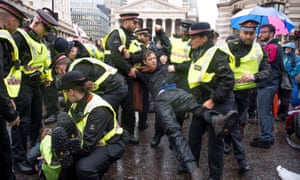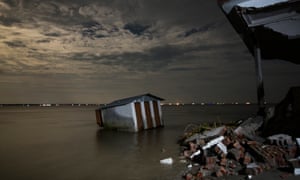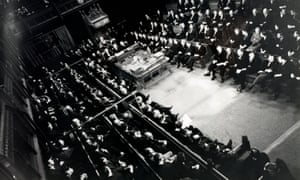By putting our bodies on the line and risking our liberty, we make this great neglected issue impossible to ignore writes George Monbiot in The Guardian

‘In the current wave of Extinction Rebellion protests, more than 1,400 people have so far allowed themselves to be arrested.’ Environmental activists are arrested in central London on Monday. Photograph: Ollie Millington/Getty Images
A few hours after this column is published, I hope to be in a police cell. I don’t yet know what the charge will be, where I will be arrested or when, but I know that if I go home this evening without feeling the hand of the law on my sleeve, I will have failed. This may sound like a strange ambition, but I believe it is a reasonable one.
If I succeed, I will be one of many. In the current wave of Extinction Rebellion protests, more than 1,400 people have so far allowed themselves to be arrested. It’s a controversial tactic, but it has often proved effective. The suffragettes, the Indian salt marchers, the civil rights movement and the Polish and East German democracy movements, to name just a few, all used it as a crucial strategy. Mass arrests are a potent form of democratic protest.
They work because they show that the campaigners are serious. When people are prepared to jeopardise their liberty for their cause, other people appear more likely to listen to what they say, and more likely to recognise its importance. Those who founded Extinction Rebellion researched these histories and sought to apply their lessons to the greatest predicament humanity has ever faced: the gathering collapse of our life support systems.
Nowhere on Earth does government action match the scale of the catastrophes we face. Part of the reason is the remarkably low level of public discussion and information on this crisis. Another is that the political risks of action are higher than the perceived rewards – a balance the protesters want to redress. But perhaps the most important factor is the brute power of the pollutocrats driving this disaster. As the Guardian’s The polluters series shows, the big fossil fuel companies have used political funding, intense lobbying and gross deceptions of the public to overwhelm environmental protections and keep harvesting their massive profits.

FacebookTwitterPinterest ‘Large numbers of people in Somalia, Mozambique, Bangladesh (above), the Caribbean and many other parts of the world are already losing their homes and livelihoods.’ Photograph: Zakir Hossain Chowdhury/Barcroft Media
Those who confront them have no such power. We cannot buy television channels and newspapers, pour billions into political lobbying or seed dark ads on social media. We have only one strength: our vulnerability. By putting our bodies on the line and risking our liberty, we make this great neglected issue impossible to ignore.
So far, the campaign has been remarkably successful. Alongside the youth climate strikes, Extinction Rebellion has changed the global conversation about climate and environmental breakdown. These movements are directly responsible for the declaration of a climate emergency by the UK parliament and many other political bodies. But this is not enough. It is one thing to recognise an emergency, another to act on it. We must do more. I cannot justifiably say “we” if I don’t mean “I”.
I know this action will expose me to criticism as well as prosecution. Like other prominent activists, I will be lambasted for hypocrisy: this is now the favoured means of trying to take down climate activists. Yes, we are hypocrites. Because we are embedded in the systems we contest, and life is complicated, no one has ever achieved moral purity. The choice we face is not between hypocrisy and purity, but between hypocrisy and cynicism. It is better to strive to do good, and often fail, than not to strive at all.
Other criticisms carry more weight. Extinction Rebellion is too white, and too middle class. Both charges are true, as the organisers recognise: they know that they must do more to break down the cultural barriers the movement unconsciously erects, engage with community leaders, and listen to voices that have not been heard.
But I cannot help who I am. I accept that the costs of arrest for people like me – a white, middle-class man with an established career – are lower than for other people. But this means I have a moral duty to use my privilege.
The victims of climate breakdown have so far been mostly voiceless and invisible to us. But we know that, even with just 1C of global heating, climate chaos is already a bigger cause of forced migration than either poverty or political oppression. Large numbers of people in Somalia, Mozambique, Bangladesh, the Caribbean, Central America and many other parts of the world are already losing their homes and livelihoods. The poor parts of the world are the least responsible for climate disaster but the most likely to suffer its effects. They carry the cost of our consumption. We have imposed this crisis on others, and must do what we can to curtail it.
Since I began writing this article, getting arrested has become easier: the police have imposed a blanket ban on “any assembly linked to the Extinction Rebellion autumn uprising” across London. This looks to me like a breach of article 20 of the Universal Declaration of Human Rights: “Everyone has the right to freedom of peaceful assembly and association.” Over the past four decades, the police have acquired an extraordinary array of powers – enabling them, in effect, to shut down any protest. But they deem even these insufficient: at a recent press conference they demanded new “banning orders” for “habitual” protesters. Given that regular protest has proved throughout history to be an essential mechanism for political reform, this looks like a direct attack on democracy.
Far from deterring me, the draconian ban this week and the police demand for even greater powers has strengthened my determination. Now I feel I am standing not only for the habitability of the planet but also for the continued right to protest. This is my duty, and I intend to fulfil it.
As Naga Munchetty’s experience at the BBC shows, challenging inflammatory language can be hazardous writes Priyamvada Gopal in The Guardian

Brexit opponents clash. ‘Inflammatory language is increasingly the norm, yet the word racism remains muffled under a curious omerta.’ Photograph: Teri Pengilley/Guardian
Politicians accuse each other of being cowardly collaborators who surrender, betray and capitulate. Commentators on television warn of riots. Inflammatory language is increasingly the norm in public life, yet one word remains muffled under a curious omertà. The BBC presenter Naga Munchetty was only the latest to discover that describing something as racist, even in a measured way, can get you into a lot of trouble.
For many people of colour in largely white institutions, this is a familiar prohibition that works to shut down much-needed discussion and create a repressive and demoralising silence.
Racism is that strange phenomenon, apparent everywhere and apparently nowhere. People believe that not “seeing” race, or being “colourblind”, is progressive, when it is merely evasive. What might happen if we took it as given that after six centuries of European imperial rule it would be astounding if most of us – including people of colour – were not shaped by the racial hierarchies put in place? The term white supremacy may invoke images of hooded Klansmen burning crosses, but it actually refers to an entrenched system of racial domination that once justified colonisation and slavery, the legacies of which still shape economic, political and social orders, particularly in the west.

Racism is emphatically not a matter of subjective “experience”. It has objective structural force that can be identified not just in discriminatory practices but in differing entitlements and unequal access to resources, representation and opportunities. “Go back to where you came from” is not just a wounding phrase that almost all people of colour and migrants have heard. Its material consequences include actual expulsions such as those of the “Windrush children” and, of course, discriminatory travel, migration and citizenship policies.
Another way of deflecting engagement with race is to personalise matters. As the sociologist Robin DiAngelo notes, insisting that there was no “intent” to be racist or asking, “how can you say I’m racist, you don’t know me”, are manifestations of “white fragility”. In this scheme, only exceptionally “bad” people can be racist, and therefore the mere suggestion of racism is often treated as more serious and hurtful than racism itself. DiAngelo makes the important point that discussions about race are bound to be uncomfortable for members of dominant communities who have to come to terms with their own entanglement in an unfair system.
To avoid such discomfort and difficulty is to refuse change. I know this from personal experience as an upper-caste woman from India who has also benefited from a deeply iniquitous system. I too have felt defensive, but there’s no way to change things without admitting to the existence of caste or race supremacy, and dealing with the fact of inevitable complicity and the inherited privilege that disadvantages others.
At the same time, “whataboutery” leads nowhere. Whenever I speak of race and empire in the British media, I receive emails asking: “What about caste” and inviting me to “go back” to India to address the caste system instead. People not normally known for a deep interest in class matters will also suddenly ask “what about the working classes?”. A now retired female manager once told me that, although sexism was still an issue at Cambridge University, racism was not. There’s no need to pit race, class, caste, gender, ability or sexuality against each other: there are no free passes in an inequitable world where each brutality shapes the others.
There are also no “race cards”. People who raise issues of racial exclusion or abuse are not demanding special treatment; on the contrary, they are arguing against the special privileges bestowed on the majority or dominant group. Most of us who raise issues of racism do so with hesitation, feeling vulnerable as we do so and fearing inevitable social and institutional reprisals. Meet a race whistleblower and you meet a deemed “troublemaker”, a position with unpleasant institutional consequences.
Discussion of race is often derailed by bogeys such as “reverse racism”. Of course it’s possible for people of colour to display hostile or denigrating attitudes towards other races, Asian anti-blackness being one example. “Racism towards white people” is not, however, systemic and does not have policy consequences. Certificates from “best friends” of colour declaring a person to be “not racist” are also void. Just as having a mother does not make men free of sexism in a patriarchal world, having a black best friend, spouse or even child cannot absolve individuals from complicity in racist language and actions. Indeed, ethnic minority politicians may themselves be used to justify such things as blackface or xenophobia.
No one is claiming that victims of racism are pure or noble. People are never purely victims and everyone has to ask tough questions of themselves. It is perfectly possible, for example, to be at once homophobic yourself and a victim of racism. Both must be tackled.
Far from “wallowing in victimhood”, people who challenge racism are acting as responsible agents of change. At a time when the forces of violent racism are globally in the ascendant once again, we can help them along by refusing to name it as such.
Alternatively, we can do the right thing: actively acknowledge racism’s existence and try to rein in its power. If we don’t choose to have difficult and urgent discussions openly, then “diversity” will remain a meaningless buzzword where people’s bodies are included in institutions but their voices are silenced.
A determined ignorance of the dynamics of global capitalism is bringing about a long-overdue audit of British realities writes David Edgerton in The Guardian

The Commons in 1966: ‘The Conservative party was the party of national capitalism.’ Photograph: Bentley Archive/Popperfoto via Getty Images/Getty Images
Who backs Brexit? Agriculture is against it; industry is against it; services are against it. None of them, needless to say, support a no-deal Brexit. Yet the Conservative party, which favoured European union for economic reasons over many decades, has become not only Eurosceptic – it is set on a course regarded by every reputable capitalist state and the great majority of capitalist enterprises as deeply foolish.
If any prime minister in the past had shown such a determined ignorance of the dynamics of global capitalism, the massed ranks of British capital would have stepped in to force a change of direction. Yet today, while the CBI and the Financial Times call for the softest possible Brexit, the Tory party is no longer listening.
Why not? One answer is that the Tories now represent the interests of a small section of capitalists who actually fund the party. An extreme version of this argument was floated by the prime minister’s sister, Rachel, and the former chancellor Philip Hammond – both of whom suggested that hard Brexit is being driven by a corrupt relationship between the prime minister and his hedge-fund donors, who have shorted the pound and the whole economy. This is very unlikely to be correct, but it may point to a more disconcerting truth.
The fact is that the capitalists who do support Brexit tend to be very loosely tied to the British economy. This is true of hedge funds, of course – but also true for manufacturers such as Sir James Dyson, who no longer produces in the UK. The owners of several Brexiter newspapers are foreign, or tax resident abroad – as is the pro-Brexit billionaire Sir James Ratcliffe of Ineos.
But the real story is something much bigger. What is interesting is not so much the connections between capital and the Tory party but their increasing disconnection. Today much of the capital in Britain is not British and not linked to the Conservative party – where for most of the 20th century things looked very different. Once, great capitalists with national, imperial and global interests sat in the Commons and the Lords as Liberals or Conservatives. Between the wars, the Conservatives emerged as the one party of capital, led by great British manufacturers such as Stanley Baldwin and Neville Chamberlain. The Commons and the Lords were soon fuller than ever of Tory businessmen, from the owner of Meccano toys to that of Lyons Corner Houses.
After the second world war, such captains of industry avoided the Commons, but the Conservative party was without question the party of capital and property, one which stood against the party of organised labour. Furthermore, the Tories represented an increasingly national capitalism, protected by import controls, and closely tied to an interventionist and technocratic state that wanted to increase exports of British designed and made goods. A company like Imperial Chemical Industries (ICI) saw itself, and indeed was, a national champion. British industry, public and private, was a national enterprise.
Since the 1970s things have changed radically. Today there is no such thing as British national capitalism. London is a place where world capitalism does business – no longer one where British capitalism does the world’s business. Everywhere in the UK there are foreign-owned enterprises, many of them nationalised industries, building nuclear reactors and running train services from overseas. When the car industry speaks, it is not as British industry but as foreign enterprise in the UK. The same is true of many of the major manufacturing sectors – from civil aircraft to electrical engineering – and of infrastructure. Whatever the interests of foreign capital, they are not expressed through a national political party. Most of these foreign-owned businesses, not surprisingly, are hostile to Brexit.
Brexit is the political project of the hard right within the Conservative party, and not its capitalist backers. In fact, these forces were able to take over the party in part because it was no longer stabilised by a powerful organic connection to capital, either nationally or locally.
Brexit also speaks to the weakness of the state, which was itself once tied to the governing party – and particularly the Conservatives. The British state once had the capacity to change the United Kingdom and its relations to the rest of the world radically and quickly, as happened in the second world war, and indeed on accession to the common market.
Today the process from referendum to implementation will take, if it happens, nearly as long as the whole second world war. The modern British state has distanced itself from the productive economy and is barely able to take an expert view of the complexities of modern capitalism. This was painfully clear in the Brexit impact sectoral reports the government was forced to publish – they were internet cut-and-paste jobs.
The state can no longer undertake the radical planning and intervention that might make Brexit work. That would require not only an expert state, but one closely aligned with business. The preparations would by now be very visible at both technical and political levels. But we have none of that. Instead we have the suggestion that nothing much will happen on no deal, that mini-deals will appear. The real hope of the Brexiters is surely that the EU will cave and carry on trading with the UK as if nothing had changed. Brexit is a promise without a plan. But in the real world Brexit does mean Brexit, and no deal means no deal.
Brexit is a necessary crisis, and has provided a long overdue audit of British realities. It exposes the nature of the economy, the new relations of capitalism to politics and the weakness of the state. It brings to light, in stunning clarity, Brexiters’ deluded political understanding of the UK’s place in the world. From a new understanding, a new politics of national improvement might come; without it we will remain stuck in the delusional, revivalist politics of a banana monarchy.
Pervez Hoodbhoy in The Dawn
INDIAN leaders of unbridled ambition and meagre wisdom have recently suggested that India might revoke its earlier policy of No First Use (NFU) of nuclear weapons. They should be forgiven. To stay in the public eye, South Asia’s street-smart politicians need to make a lot of noise all the time. Most did not do very well in school and even fewer made it to college or university (and some ended up playing sports there).
Nuclear strategists, on the other hand, are advertised to be academic hotshots. The high-flying ones belong to various think tanks and universities — including prestigious ones in the United States. These so-called experts fill academic journals with thickly referenced research papers, participate in weighty-sounding conferences, and endlessly split hairs on minutiae like the difference between nuclear deterrence versus nuclear dissuasion.
Slyly hinting that NFU has run its course and needs a replacement, several Indian strategists have been openly flirting with a so-called counterforce doctrine — ie the possibility of knocking out Pakistan’s nuclear forces before they are activated. Paid to serve power rather than truth, like the proverbial serpent they whisper ideas into eager official ears. Their academic discourse and heavy language gives the impression that they really know what they are talking about. They don’t. In fact, they are clueless.
Here’s why. Every nuclear nation confines its deepest secrets to an extremely tight inner circle. Outsiders — meaning civilians — are excluded from what is critical. They cannot know such crucial details as the chain of nuclear command, geographical dispersal of warheads and delivery vehicles, intelligence on how well the adversary has concealed its nukes, whether warheads are mated or de-mated from delivery vehicles, integrity of communication channels, the efficacy of decoys and countermeasures, and much other vital information that would determine whether a first strike would achieve its objective.
So how do self-important know-nothing strategists — Indian, Pakistani, and American — ensure their salaries will continue reaching their bank accounts? Well, they write papers and therefore have to perfect the art of saying nothing — or perhaps next to nothing — in 5,000 words. Fact: no nuclear strategist knows the threshold of a nuclear war, can predict the sequence of events following a first strike, or persuasively argue whether nuclear hostilities could somehow be wound down. Of course he can guess — just as every Tom, Dick, and Harry can. But guesses are only guesses.
Could it perhaps be better inside a military organisation? War gaming is certainly a compulsory part of an officer’s training and one can feed parameters into a computer set up for simulating the onset and subsequent trajectory of a nuclear conflict. If properly programmed and proper probabilities are inputted, it will output the probabilities of various possible outcomes. But, as in tossing coins, probabilities make sense only when something can be repeated a large number of times. The problem is that nuclear war can happen only once.
That’s bad enough but, in fact, it’s even worse than that. You can give probabilities for missiles to be intercepted or for getting through, and for mechanical and electrical systems to work or fail. But you cannot assign probabilities for humans to act in a particular way during a crisis because that depends on mood, perception, personality and circumstance. Nuclear strategy pretends to be a science but is by no means one. Where has the other party drawn its nuclear red line (the real, not stated, one)? No one knows.
Consider: would one nuke fired at invading Indian tanks from a Pakistani Nasr missile battery elicit zero, one, three, or 30 Indian nukes as retaliation? The Indians say that a single nuke used against them, whether on Pakistani or Indian soil, constitutes a full-blown nuclear attack upon India. Should one believe them? Would panic ensue and cause one or both sides to descend into a totalistic use-them-or-lose-them mode? No one knows.
The nuclearised confrontation between India and Pakistan over Kashmir is best seen as a territorial fight between two street cats. I have had occasion to watch several. You can hear the growls grow louder. These then combine with hissing after which howls and growls get mixed. Sometimes they fight and sometimes not. Since they have only claws and teeth, never do both cats end up dead. But with nuclear weapons two opponents would strictly eliminate each other. In addition, their war would seriously devastate neighbouring countries and poison much of the globe.
The catfight analogy helps illuminate, for example, Defence Minister Rajnath Singh’s statement that continuation of India’s NFU policy depends upon ‘circumstances’. Since he left ‘circumstances’ unspecified, this could cover everything under the sun. Although dozens of articles were published commenting on his statement, in fact it carried exactly zero content. NFU is purely declaratory, impossible to verify and impossible to enforce. Nevertheless the statement was significant — the growling had become a tad louder. Plus, did you hear a slight hiss?
India’s hint at moving away from NFU towards counterforce owes to its increased military advantage over Pakistan. But hubris often paves the way to overconfidence and disaster. As every military commander worth his salt knows, all plans look fine until the battle begins. Last week a ragtag Houthi militia took out 50 per cent of Saudi Arabia’s oil-producing capacity, underscoring how even a relatively ill-equipped force can wreck an adversary bristling with the most advanced weapons that limitless oil dollars could buy. Sellers of snake oil and con men do not deserve anyone’s ears or respect. Whoever advocates a nuclear first strike should be quickly locked up in a mental asylum.
Some years after the Kargil episode, Gen Pervez Musharraf realised that nuclear weapons had brought Pakistan and India to an impasse. He is so far the only leader courageous enough to explicitly acknowledge this and — most importantly — to say out aloud that, for better or for worse, mutual fear of nuclear annihilation has etched the LoC in stone. It remains to be seen if other Pakistani and Indian leaders can dare to follow his example. Only then might peace get half a chance.




